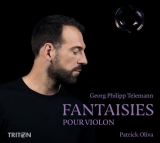Für Interessierte sind die zwölf Fantasien für Violine ohne Bass von Georg Philipp Telemann eine eigene Gebirgslandschaft, die man sich erwandern muss. Vielleicht bieten sie von der Musik her nicht die hohen Gipfel wie die Partiten und Sonaten von Bach, aber deswegen sind sie noch lange nicht zu missachten.
Die Gesamteinspielung stellt sich somit als Abenteuer da. Was an Gipfeln fehlen mag, bieten hier Reichtum und die Subtilitäten, die auf den ersten Blick in den so einfachen Stücken kaum zu entdecken sind. Den Geiger Patrick Oliva fasziniert die Aufrichtigkeit und Spontaneität der 40 Sätze. Er hat Humor und Leichtigkeit gefunden, ohne dass die Werke je an Tiefe verlieren.
Diese Frische und Zerbrechlichkeit der Fantasien hat Oliva versucht, in seinem Spiel zu zeigen. Und es ist ihm deutlich gelungen. Sein Spiel mag man vielleicht mit dem Vortrag eines Gedichts vergleichen. Auch da darf man den Text nicht nur herunterleiern, sondern muss ihn gestalten. Aber Oliva schafft es, nicht effektuös zu deklamieren, sondern er bleibt in seinem persönlichen Gestaltungsduktus, den er mit leichten Schwankungen wie in Momenten des Überlegens frisch hält und von abgespultem Runternudeln, vor Plakativem schützt.
Patrick Oliva studierte in Genf und bei Florence Malgoire, wo er sich auf die Barockvioline spezialisierte, bevor in Paris abschloss. Als Geiger in historisch informierten Ensembles wie Les Arts Florissants, Les Talens Lyriques und mit zahlreichen Kammermusikkonzerten konnte er seine Neugier nutzen, um seine künstlerischen Ansätze zu diversifizieren. Das Verhältnis zwischen der geschriebenen Partitur und ihrer Interpretation prüfend, forscht er im Repertoire des Barock, etwa zu Ornamentierung und Improvisation.
Diese umfangreichen Analysen finden hier in diesem Zyklus eine ebenso lebendige wie klangreiche Umsetzung, die in 80 Minuten die Ohren der Zuhörer immer in Bann zieht. Eine passende Aufnahmegestaltung hat den Klang des Instruments sehr angenehm unaufdringlich und trotzdem nah und direkt eingefangen, so dass es an nichts mangelt.
For those interested, the twelve fantasias for violin without bass by Georg Philipp Telemann are a mountainous landscape of their own that you have to hike through. They may not offer the high peaks of Bach’s partitas and sonatas, but that doesn’t mean they should be disregarded.
The complete recording is therefore an adventure. What may be lacking in peaks is offered here by richness and subtleties that are hard to discover at first glance in such simple pieces. Violinist Patrick Oliva is fascinated by the sincerity and spontaneity of the 40 movements. He has found humor and lightness without the works ever losing their depth.
Oliva has tried to show this freshness and fragility of the fantasies in his play. And he has clearly succeeded. His performance can perhaps be compared to reciting a poem. Here, too, you can’t just rattle off the text, you have to shape it. But Oliva manages not to declaim effectively. Instead, he remains in his own personal style, which he keeps fresh with slight fluctuations, as in moments of reflection, and protects it from being too bold.
Patrick Oliva studied in Geneva and with Florence Malgoire, where he specialized in the baroque violin, before graduating in Paris. As a violinist in historically informed ensembles such as Les Arts Florissants, Les Talens Lyriques and with numerous chamber music concerts, he was able to use his curiosity to diversify his artistic approaches. Examining the relationship between the written score and its interpretation, he researches the Baroque repertoire, for example on ornamentation and improvisation.
These extensive analyses find a lively and sonorous realization in this cycle, which captivates the listener’s ears throughout its 80 minutes. A suitable recording design has captured the sound of the instrument very pleasantly unobtrusive and yet close and direct, so that nothing is missing.

























